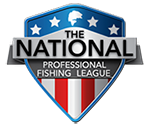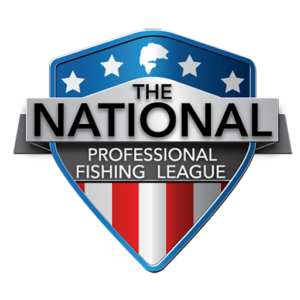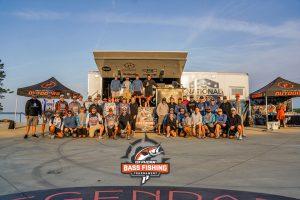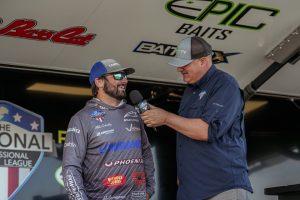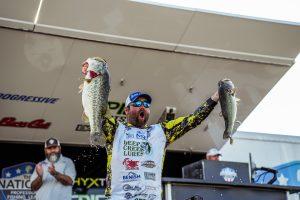Story by Justin Brouillard | Photos & Video by Tanner & Travis Lyons
To win a professional level multi-day event, a lot of things have to go right. Good decisions need to be made before and throughout the tournament, several alterations to the game plan and bait changes likely necessary and execution on lost fish is a must. When things line up, whether an angler had a good practice or not, good things happen.
Here is a look at our season two 2022 event winners as they dive into what went well and the good decisions that turned into an NPFL victory. They also tell us what went wrong at one of the events and the decisions that turned into a subpar event.
Event 1: Lake Cumberland
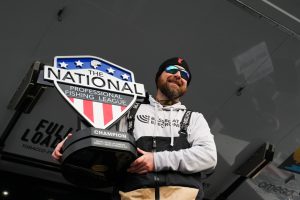
Angler: Taylor Watkins
What went well:
With a completely different tournament at Lake Cumberland, Taylor Watkins was fishing for one bite during the one day of competition and went to the area he had got the most bites in practice. The first two days of the event were canceled due to high, unsafe water and the anglers had one day to catch their biggest weight. Although it was not a typical event, Watkins did what he was comfortable with and fished a clean water intake area for all it was worth.
“This one was completely different as we only had the one day. Practice was tough due to the weather and the water continued to rise and change things drastically. I had a few bites in one creek in practice and it was an easy decision to go there for the event,” said Watkins.
With a few quick bites to start his day off, he decided he was going to forgo running around an unsafe Cumberland and stay put.
“Anytime you can get a few bites early, it makes it easy to settle in. I knew in that first few hours there were bass around and I had to stay and grind. I only needed a few more bites after that and I was able to catch some bigger bass fishing back and forth in my area.”
What went bad: Watts Bar
Combine his local knowledge with a stellar practice and Watkins would have no reason to believe he would have anything less than a good event. With high hopes, a few unlucky breaks, the event at Watts Bar did not go how he had planned.
“I thought the first day I would have 14-pounds in the first half hour and 19 to 20-pounds soon after. First thing in the morning I lost two and only landed one – I knew then it was not going to be good.”
After striking out on his starting spot, he made a long run to the other end of the lake and fished a marine. After fishing the entire thing with no bites, he decided to leave without fishing the last boat slip.
“That slip I didn’t fish was where Pug fished and caught almost his entire weight for the week and made a top ten. We were fishing the same technique and I left before I got there. Pug got into them good and didn’t have a lot of other history to run. He stuck it out and had a great event.”
On day two, he made some good decisions with the conditions changing and ended up breaking off two big fish which cost him any sort of comeback. On day three, he settled in and caught a good bag, but it was too late after the tough couple days prior.
Event 2: Lake Hartwell
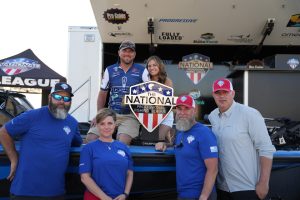
Angler: Drew Six
What went well:
Drew Six took the win at stop # 2 of the NPFL season on Lake Hartwell. The buzz throughout the field was the herring bite would be strong enough to win, but Six had other ideas.
“I found out quickly during practice that it wasn’t going to happen for me and I started fishing shallow and ran into the winning pattern,” Six said. “I found some fish shallow and never saw any other boats around me in those areas and knew I had some fish to myself.”
Going with his gut and working on locating spawning fish, Six was able to find enough spots and executed perfectly throughout the tournament.
“It was epic – I knew the fish were new fish moving up and it turns out I was able to locate new spawners each day. I did see other anglers fishing for some spawning bass but they got discouraged when they wouldn’t bite.”
He figured out where the new fish were moving up to spawn and downsized his equipment for a super finesse presentation.
“I was looking for deep areas next to points with wood and sure enough there were fish there. I got dialed into that and knew where fish would be on that same type of thing. Everyone also knows the big key to getting them to bite was light line”
What went bad: Saginaw Bay
Finishing up 87th at Saginaw Bay was not what Six had in mind for the first Great Lakes tournament of the season. With plenty of experience with smallmouth fishing, he got sucked into fishing for brown fish in practice even though he knew the changing weather during the event would make things tougher.
“I should have known; I know Saginaw Bay doesn’t fish great after the spawn but I stuck with it anyways and it burned me. I had some 20-pound smallmouth days in practice and that did me in. The weather was not in my favor and I didn’t adjust until it was too late.”
On the final two days of the tournament, Six abandoned his smallmouth after a tough day one and focused on largemouth bass. He was able to catch over 13-pounds each of the final two days but his day one weight was enough to keep him from getting a check.
Event 3: Watts Bar
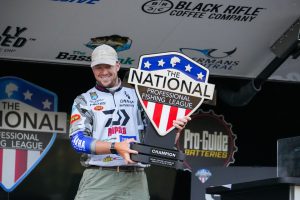
Angler: Patrick Walters
What went well:
Before arriving to Watts Bar, Walters was fully committed to fishing deep the entire event. For three days of practice, he did not fish shallow once and despite his roommates having success shallow, he stuck with his deep pattern and executed to take the win.
“With an Elite Series event soon after, I wanted to really get in the groove and scrub my skills for that event, and I genuinely thought I had a good chance to do well.”
Walters executed his deep bite and was able to fish clean and get a few key big bites in route to winning the NPFL Shield.
“Staying committed even though guys caught them shallow was the key. I made good decisions and ran around and fished a lot of spots and caught some quality bass.”
What went bad: Watts Bar
Saginaw Bay is the same story as Watts Bar, but a completely different outcome for Walters. He committed fully to smallmouth bass and if he was able to land five, the story is different.
“I caught them good on day one but on day two I only caught two bass and it hurt me. I knew if I had fished for some largemouth, I could have salvaged the day but ended up never making a cast for them. I am stubborn as a mule but on day three I caught five smallies and made a big come back. I made my own decisions based on the conditions and stuck with it. It’s a pill I can swallow but I could have made it interesting.”
Event 4: Saginaw Bay
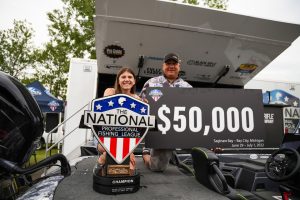
Angler: Gary Adkins
What went well:
When you combine a smallmouth guru with a Great Lakes tournament, good things usually happen. With the majority of the field deciding not to gamble on smallmouth, Gary Adkins knew it was his event to win.
“I was able to execute and land the key bites I got but I knew coming in if I could withstand the beating from heavy winds, I had a chance to win.
Adkins did just that. With the big fading throughout the event from practice, Adkins stuck through it and was able to grind out enough weight to hold off the charge from Trent Palmer who was fishing a mix of small and largemouth bass.
“If I could have done anything different it that tournament, I would have changed spots up a bit more and looked for some individual fish.”
What went bad: Lake Hartwell
Going into the Lake Hartwell event, Adkins has high hopes with some history on the body of water. He had a great practice with lots of big fish caught in practice but with changing conditions, the tournament was a little different.
“I was able to catch 15 to 19-pounds in practice pretty easy but we had some winds blowing that aided the bite. The tournament was completely different and slick conditions and it was totally different. The fish were still there, but they would not commit. I could get them to chase but they would not bite.”
Without the wind, his chances of a strong finish diminished. He continued to fish strong and was only able to catch smaller fish for his toughest event of the season in route to winning the Progressive Angler of the Year Title.
“Due to the slick conditions forecasted, I probably should have gone shallow and sight fished but I abandoned that theory and it turns out that’s how Drew was able to win the event fishing for bedded bass.”
Event 5: Sandusky Bay
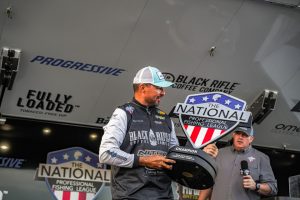
Angler: Scott Siller
What went well:
Coming into the event on Sandusky Bay, Scott Siller knew what he had to do. By fully committing to the islands area, he put himself in position to find the winning fish.
Despite practicing one day of practice closer to the take off in case winds didn’t allow him to get to his fish, Siller executed his plan to earn the victory.
“I knew it was going to be all smallmouth in this event and history says they live by the islands. I was able to find some fish in practice and move with them throughout the tournament.
What went bad: Saginaw Bay
Going into Saginaw Bay, Siller knew he needed to catch smallies to have a shot to win. With windy conditions in practice, he spent less time looking for smallmouth areas and more time on largemouth.
“I thought I could catch some decent fish shallow and I ended up with 11 or 12-pounds. I wouldn’t have felt comfortable going out there blind and I struggled in the small amount of time I looked for smallmouth during practice.”
Siller focused his smallmouth efforts in areas out of the wind but between boat pressure and wind forecast, he opted against it.
“I wish I had weathered the storm and stuck with the smallmouth. I did have a limit of largemouth all three days but not the right size. The number of fish I could catch kept me there but it was the wrong thing to do to win the tournament.”
Event 6: Kissimmee Chain of Lakes
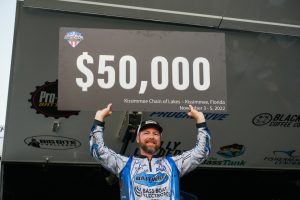
Angler: Taylor Watkins
What went well:
Winner of the first event at Lake Cumberland, Taylor Watkins made the right decisions at Kissimmee to add his 3rd NPFL Victory to his mantle. Watkins kept driving by an area during practice and noticed how it seemed to have the right ingredients. After finally stopping to sample it, he quickly learned he may have found some productive water.
“It just felt right and looked right – I stopped about ½ mile past the sweet spot and started fishing and getting bites. I knew it was going to be good and kept expanding on it.”
Going into the first day it was an easy decision to focus his efforts in the area and it paid off. The big decision that led to his win was on day two.
“When I was struggling on the second day and had a very small limit, I kept my cool and kept working. The big key was relocating those fish we were catching before. I was able to make a couple right decisions and salvage the day.”
On day three, with a good idea of what was going on, Watkins knew what he had to do and once he realized the fish were still set up, it was game time.
“It was more or less looking at the Livescope but once I knew where the bass were, all it took was a precise cast and they were biting. I made a key switch in baits from practice to the event after losing a few good bass on a jerkbait. The worm set up was perfect for the fish along the edges of the pads and I was able to get them in the boat.”
What went bad: Saginaw Bay
Winning two events and finishing runner up in the Angler of the Year standings, it’s hard to find something that went wrong. Saginaw Bay is one that he would certainly like back.
“I had two main areas I could catch some fish on and I started the first day on the wrong one. John Soukup started on the other one and it was the main deal and it carried him to the top ten. I was on the outside looking in and respected his water just trying to survive. That one decision could have changed the entire event.”
